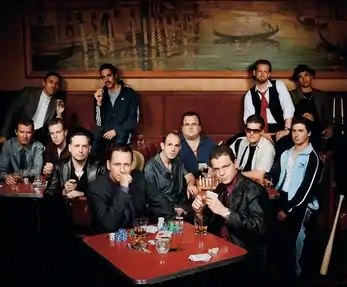
The "PayPal Mafia" is a group of former PayPal employees and founders who have since founded and/or developed additional technology companies based in Silicon Valley[1] such as Tesla, Inc., LinkedIn, Palantir Technologies, SpaceX, Affirm, Slide, Kiva, YouTube, Yelp, and Yammer.[2] Most of the members attended Stanford University or University of Illinois Urbana-Champaign at some point in their studies.
History
Originally, PayPal was a money-transfer service offered by a company called Confinity which was acquired by X.com in 1999. Later, X.com was renamed PayPal and purchased by eBay in 2002.[3] The original PayPal employees had difficulty adjusting to eBay's more traditional corporate culture and within four years all but 12 of the first 50 employees had left.[4] They remained connected as social and business acquaintances,[4] and a number of them worked together to form new companies and venture firms in subsequent years. This group of PayPal alumni became so prolific that the term PayPal Mafia was coined.[3] The term[5] gained even wider exposure when a 2007 article in Fortune magazine used the phrase in its headline and featured a photo of former PayPal employees in gangster attire.[5]
Members
Individuals whom the media refers to as members of the PayPal Mafia include:[5][4]
- Peter Thiel, PayPal founder and former chief executive officer who is sometimes referred to as the "don" of the PayPal Mafia
- Max Levchin, founder and chief technology officer at PayPal
- Elon Musk, co-founder of Zip2, founder of X.com which merged with Confinity to form PayPal. Musk later founded SpaceX, invested in, co-founded Tesla, Inc., co-founded OpenAI, Neuralink, founded The Boring Company, and purchased Twitter
- David O. Sacks, former PayPal COO who later founded Geni.com and Yammer
- Scott Banister, early advisor and board member at PayPal[6]
- Roelof Botha, former PayPal CFO who later became a partner at the venture capital firm Sequoia Capital
- Steve Chen, former PayPal engineer who co-founded YouTube
- Reid Hoffman, former executive vice president who later founded LinkedIn and was an early investor in Facebook, Aviary
- Ken Howery, former PayPal CFO who became a partner at Founders Fund
- Chad Hurley, former PayPal web designer who co-founded YouTube
- Eric M. Jackson, who wrote the book The PayPal Wars and became chief executive officer of WND Books and co-founded CapLinked
- Jawed Karim, former PayPal engineer who founded YouTube
- Jared Kopf, executive assistant to Peter Thiel at PayPal who co-founded Slide, HomeRun and NextRoll
- Dave McClure, former PayPal marketing director, a super angel investor for startup companies
- Andrew McCormack, co-founder of Valar Ventures
- Luke Nosek, PayPal co-founder and former vice president of marketing and strategy, became a partner at Founders Fund with Peter Thiel and Ken Howery
- Keith Rabois, former executive at PayPal who later worked at LinkedIn, Slide, Square, Khosla Ventures, and currently with Peter Thiel at Founders Fund, and invested in Tokbox, Xoom, Slide, LinkedIn, Geni, Room 9 Entertainment, YouTube, and Yelp
- Jack Selby, former vice president of corporate and international development at PayPal who co-founded Clarium Capital with Peter Thiel, later becoming managing director of Grandmaster Capital Management
- Premal Shah, former product manager at PayPal, became the founding president of Kiva.org
- Russel Simmons, former PayPal engineer who later co-founded Yelp
- Jeremy Stoppelman, former vice president of technology at PayPal who later co-founded Yelp
- Yishan Wong, former engineering manager at PayPal, later worked at Facebook, became the CEO of Reddit, and founded Terraformation Inc.
- Yu Pan, was one of the co-founders of PayPal and played a role in designing the company's user interface and user experience. Who later involved in private ventures and some of the successful startups.
Legacy
The PayPal Mafia is sometimes credited with inspiring the re-emergence of consumer-focused Internet companies after the dot-com bust of 2001.[7] The PayPal Mafia phenomenon has been compared to the founding of Intel in the late 1960s by engineers who had earlier founded Fairchild Semiconductor after leaving Shockley Semiconductor.[3] They are discussed in journalist Sarah Lacy's book Once You're Lucky, Twice You're Good. According to Lacy, the selection process and technical learning at PayPal played a role, but the main factor behind their future success was the confidence they gained there. Their success has been attributed to their youth; the physical, cultural, and economic infrastructure of Silicon Valley; and the diversity of their skill sets.[3] PayPal's founders encouraged tight social bonds among its employees, and many of them continued to trust and support one another after leaving PayPal.[3] An intensely competitive environment and a shared struggle to keep the company solvent despite many setbacks also contributed to a strong and lasting camaraderie among former employees.[3][8]
See also
References
- ↑ Staff Writer. "David Sacks: Biography". Wall Street Journal. Archived from the original on February 22, 2014. Retrieved August 30, 2013.
- ↑ Harris, Duke (October 22, 2009). "PayPal finally poised to enter Web 2.0". San Jose Mercury News.
- 1 2 3 4 5 6 Helft, Miguel (October 17, 2006). "It Pays to Have Pals in Silicon Valley". The New York Times.
- 1 2 3 Soni, Jimmy (2022). The Founders: The Story of Paypal and the Entrepreneurs Who Shaped Silicon Valley. Simon & Schuster. ISBN 978-1501197260.
- 1 2 3 "The PayPal Mafia". Fortune. November 13, 2007.
- ↑ Gelles, David (April 1, 2015). "The PayPal Mafia's Golden Touch". New York Times. Retrieved April 7, 2022.
- ↑ Banks, Marcus (May 16, 2008). "Nonfiction review: 'Once You're Lucky'". San Francisco Chronicle.
- ↑ Tweney, Dylan (November 15, 2007). "How PayPal Gave Rise to a Silicon Valley 'Mafia'". Wired.